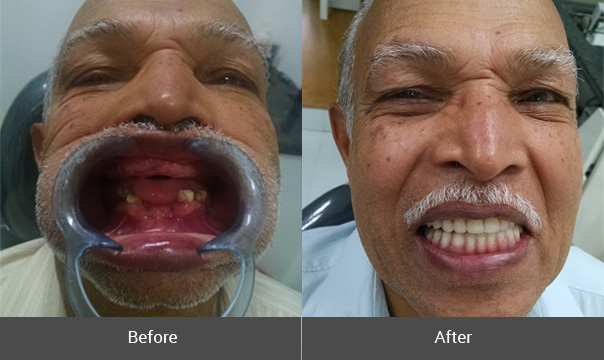Dentures in Pune
How dentures are fitted
Complete Dentures
A full denture will be fitted if all your upper or lower teeth need to be removed or you’re having an old complete denture replaced. The denture will usually be fitted as soon as your teeth are removed, which means you won’t be without teeth. The denture will fit snugly over your gums and jawbone.
However, if you have dentures fitted immediately after the removal of several teeth, the gums and bone will alter in shape fairly quickly and the dentures will probably need relining or remaking after a few months.
Occasionally, your gums may need to be left to heal and alter in shape for several months before dentures can be fitted. You can either see a dentist or a qualified clinical dental technician to have your dentures made and fitted. The difference between a dentist and a clinical dental technician (in terms of producing dentures) is outlined below.
- A dentist – will take measurements and impressions (moulds) of your mouth, and then order your full or partial dentures from a dental technician.
- A clinical dental technician – will provide a full set of dentures directly without you having to see your dentist (although you should still have regular dental check-ups with your dentist).
A trial denture will be created from the impressions taken of your mouth. The dentist or clinical dental technician will try this in your mouth to assess the fit and for you to assess the appearance. The shape and colour may be adjusted before the final denture is produced.
Partial Dentures
A partial denture is designed to fill in the gaps left by one or more missing teeth. It’s a plastic, nylon or metal plate with a number of false teeth attached to it. It usually clips onto some of your natural teeth via metal clasps, which hold it securely in place in your mouth. It can easily be unclipped and removed.
Occasionally, the clips can be made of a tooth- or gum-coloured material, although this type of clip isn’t always suitable, because it tends to be more brittle than metal.
Your dentist can measure your mouth and order a partial denture for you, or you can see a qualified clinical dental technician, who can provide a partial denture for you directly after you’ve first seen your dentist for a treatment plan and certificate of oral health.
Looking after your dentures
Dentures may feel a bit strange to begin with, but you’ll soon get used to wearing them.
At first, you may need to wear your dentures all the time, including while sleeping. Your dentist or clinical dental technician will advise you on whether you should remove your dentures before you go to sleep.
It isn’t always necessary to remove your dentures at night, but doing so can allow your gums to rest as you sleep. If you remove your dentures, they should be kept moist – for example, in water or a polythene bag with some dampened cotton wool in it, or in a suitable overnight denture-cleaning solution. This will stop the denture material from drying out and changing shape.
We at Dental Sphere practice:
Routine and Telescopic Dentures
(Overlay Dentures)
B.P.S and CPD Valplast Dentures
- Partial Dentures
Implant supported Dentures
- Who needs a denture?
- How long can I have my dentures?
- How much do dentures cost?
- How will dentures make me look?
A. One who has missing teeth to a varying degree can wear a denture.
A. Dentures typically last between 5 and 10 years. Make sure that after using a denture you see your dentist at least twice a year for regular check up.
A. Costs vary depending on the kind of dentures you need.
A. Dentures enhance your personality and give you a more real, natural look.







